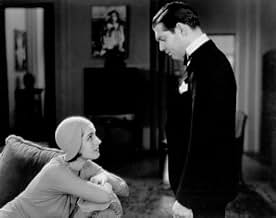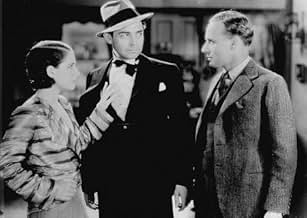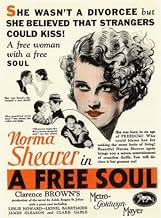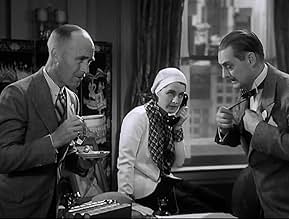NOTE IMDb
6,6/10
3,1 k
MA NOTE
Un avocat alcoolique qui a défendu avec succès un joueur notoire accusé de meurtre s'oppose à ce que sa fille libre-esprit s'engage dans une relation avec lui.Un avocat alcoolique qui a défendu avec succès un joueur notoire accusé de meurtre s'oppose à ce que sa fille libre-esprit s'engage dans une relation avec lui.Un avocat alcoolique qui a défendu avec succès un joueur notoire accusé de meurtre s'oppose à ce que sa fille libre-esprit s'engage dans une relation avec lui.
- Réalisation
- Scénario
- Casting principal
- Récompensé par 1 Oscar
- 4 victoires et 2 nominations au total
Roscoe Ates
- Man Shot at in Men's Room
- (non crédité)
Ann Brody
- Hamburger Saleslady
- (non crédité)
Edward Brophy
- Slouch
- (non crédité)
Clarence Burton
- Detective
- (non crédité)
James Donlan
- Reporter
- (non crédité)
Bess Flowers
- Birthday Party Guest
- (non crédité)
Francis Ford
- Skid Row Drunk
- (non crédité)
Henry Hall
- Detective in Raid
- (non crédité)
George Irving
- Johnson - Defense Attorney
- (non crédité)
Edward LeSaint
- Judge
- (non crédité)
Eric Mayne
- Party Guest
- (non crédité)
Sam McDaniel
- Casino Valet
- (non crédité)
Avis à la une
They are alike, this father & daughter. Liberal, passionate, willful - they live life on their own terms, disdaining their narrow-minded relations. Few regrets & even fewer apologies cloud either conscious - yet each harbors a character trait that threatens to destroy them. Hers is emotional instability; his, acute alcoholism. Although both will make bad choices that will haunt them, each will continue to see their reflection in the other, unique & individual, A FREE SOUL.
Based on a book by Adela Rogers St. Johns, Norma Shearer gets top billing in this aged but enjoyable soap opera, and she is very good, turning on the histrionics most effectively. But it is Lionel Barrymore who gets full honors - and a Best Actor Oscar - for his portrayal of her brilliant, tragic, lawyer father. Masterfully, he dominates his every scene. His final appearance, a tempestuous summation to a murder trial jury, is considered a classic.
Playing the two very different men in Shearer's life are Clark Gable & Leslie Howard. Gable is excellent, oozing the virility that was about to make him a huge star. Howard deftly underplays his less flashy role and becomes the film's calm center. James Gleason as Barrymore's factotum, and Lucy Beaumont as Barrymore's patrician mother, both give memorable performances. Film mavens will spot Edward Brophy as one of Gable's henchmen & master stutterer Roscoe Ates as the man in the washroom window.
Based on a book by Adela Rogers St. Johns, Norma Shearer gets top billing in this aged but enjoyable soap opera, and she is very good, turning on the histrionics most effectively. But it is Lionel Barrymore who gets full honors - and a Best Actor Oscar - for his portrayal of her brilliant, tragic, lawyer father. Masterfully, he dominates his every scene. His final appearance, a tempestuous summation to a murder trial jury, is considered a classic.
Playing the two very different men in Shearer's life are Clark Gable & Leslie Howard. Gable is excellent, oozing the virility that was about to make him a huge star. Howard deftly underplays his less flashy role and becomes the film's calm center. James Gleason as Barrymore's factotum, and Lucy Beaumont as Barrymore's patrician mother, both give memorable performances. Film mavens will spot Edward Brophy as one of Gable's henchmen & master stutterer Roscoe Ates as the man in the washroom window.
Some movies are theatrical in the sense that all their values and methods are derived from stage values. This is one.
Some movies are in that sweet spot after talkies got going and before the code was enforced, so they have a vitality that is lacking for a few decades afterwards.
This fits those two overlapping pockets and is a fine example of theatrical acting. The story is simple: a woman from a "fine" family spends time with a gangster for exciting sex. She has an unnatural bond with her "mountebank" father, a drunken lawyer both of which characteristics give him an excuse to be broad in his acting style.
The father forbids the affair and dramatic complications arise. Its an excuse for speechifying, which is done fabulously so long as you understand the tradition. Barrymore is perhaps the last great speechifier in this tradition, though Olivier would hang on for much longer and be celebrated out of nostalgia.
There's an interesting fold in this. The audience has a surrogate on screen, in the jury. Courtroom movies have since this grown into a solid tradition. As the case is made to the jury, it is made to us. This is special because was an early edition of that model, say before Mockingbird and Christie. Because of that, the speechifying to us/jury is fresher, more direct, less burdened with mature movieness.
Ted's Evaluation -- 2 of 3: Has some interesting elements.
Some movies are in that sweet spot after talkies got going and before the code was enforced, so they have a vitality that is lacking for a few decades afterwards.
This fits those two overlapping pockets and is a fine example of theatrical acting. The story is simple: a woman from a "fine" family spends time with a gangster for exciting sex. She has an unnatural bond with her "mountebank" father, a drunken lawyer both of which characteristics give him an excuse to be broad in his acting style.
The father forbids the affair and dramatic complications arise. Its an excuse for speechifying, which is done fabulously so long as you understand the tradition. Barrymore is perhaps the last great speechifier in this tradition, though Olivier would hang on for much longer and be celebrated out of nostalgia.
There's an interesting fold in this. The audience has a surrogate on screen, in the jury. Courtroom movies have since this grown into a solid tradition. As the case is made to the jury, it is made to us. This is special because was an early edition of that model, say before Mockingbird and Christie. Because of that, the speechifying to us/jury is fresher, more direct, less burdened with mature movieness.
Ted's Evaluation -- 2 of 3: Has some interesting elements.
"A Free Soul" made Hollywood take notice of a young actor by the name of Clark Gable.Slapping leading lady Norma Shearer around,he portrayed masculinity like no star,with the exception of perhaps Jim my Cagney, had done before him.Lionel Barrymore won the Oscar for his very good performance of the alcoholic defense lawyer. I've always found him overacting his parts but he's very believable in this movie.Norma Shearer is also very good,but still overdoes the dramatics with her silent screen acting.But she's really a stunner in the quiet parts. Leslie Howard has once again one of his thankless parts which doesn't tax his ability at all.A very enjoyable picture.
For those of you who did not have the dubious pleasure of seeing one of Elizabeth Taylor's lesser films, The Girl Who Had Everything, here's the original film it was taken from. A Free Soul is the story of a girl who misuses the freedom her father gave her in her upbringing.
The film is based on a story Adela Rogers St. John wrote, that drew from her relationship with her father, famed criminal defense attorney Earl Rogers. Rogers set the mold for the famous criminal attorneys we've seen in action down to today. Unfortunately he was a man with a severe drinking problem which in the end got the better of him.
He did not come from the upper crust that Lionel Barrymore as Stephen Ashe comes from. In fact the real Earl Rogers's father was a minister. Yet Barrymore creates a compelling and brilliant, but dissolute figure who raises his daughter to be broadminded and tolerant and to despise some of the snobs from her class.
Norma Shearer takes the lessons to heart only too well. She leaves stalwart beau, polo playing Leslie Howard, for gambler/racketeer Clark Gable. Gable's a client of Barrymore's who Barrymore got off on a gambit that Johnnie Cochran used successfully defending O.J. Simpson and he's rather full of himself.
Barrymore turns out to be a bit of a snob himself in the end, telling Gable he's not good enough for his little girl. Of course Norma has her own ideas.
This film was the first really big break for Clark Gable. Movie audiences went for his animal magnetism in a big way. Even though Barrymore won the Best Actor Oscar for his performance by virtue of an unforgettable courtroom speech at the finish, it was Gable who got all the newspaper print.
Norma Shearer got a Best Actress nomination, but lost to fellow MGM contract player Marie Dressler for Min and Bill. A Free Soul which was a pre-Code film, explored the theme of sexual satisfaction ever so gingerly, but in a way after 1935 could not be seen for thirty years on the screen. Shearer is also giving one of her best screen performances.
Leslie Howard I'm afraid had real little to do, but look patient and noble as the society polo player. Howard exuded class and distinction even when he's penniless as in The Petrified Forest. So much the better for him when he's dressed in tails.
A Free Soul is light years better than The Girl Who Had Everything and holds up very well for today's audience.
The film is based on a story Adela Rogers St. John wrote, that drew from her relationship with her father, famed criminal defense attorney Earl Rogers. Rogers set the mold for the famous criminal attorneys we've seen in action down to today. Unfortunately he was a man with a severe drinking problem which in the end got the better of him.
He did not come from the upper crust that Lionel Barrymore as Stephen Ashe comes from. In fact the real Earl Rogers's father was a minister. Yet Barrymore creates a compelling and brilliant, but dissolute figure who raises his daughter to be broadminded and tolerant and to despise some of the snobs from her class.
Norma Shearer takes the lessons to heart only too well. She leaves stalwart beau, polo playing Leslie Howard, for gambler/racketeer Clark Gable. Gable's a client of Barrymore's who Barrymore got off on a gambit that Johnnie Cochran used successfully defending O.J. Simpson and he's rather full of himself.
Barrymore turns out to be a bit of a snob himself in the end, telling Gable he's not good enough for his little girl. Of course Norma has her own ideas.
This film was the first really big break for Clark Gable. Movie audiences went for his animal magnetism in a big way. Even though Barrymore won the Best Actor Oscar for his performance by virtue of an unforgettable courtroom speech at the finish, it was Gable who got all the newspaper print.
Norma Shearer got a Best Actress nomination, but lost to fellow MGM contract player Marie Dressler for Min and Bill. A Free Soul which was a pre-Code film, explored the theme of sexual satisfaction ever so gingerly, but in a way after 1935 could not be seen for thirty years on the screen. Shearer is also giving one of her best screen performances.
Leslie Howard I'm afraid had real little to do, but look patient and noble as the society polo player. Howard exuded class and distinction even when he's penniless as in The Petrified Forest. So much the better for him when he's dressed in tails.
A Free Soul is light years better than The Girl Who Had Everything and holds up very well for today's audience.
Norma Shearer slinks and giggles her way through another melodrama, this one noted for not only her but the presence of Lionel Barrymore, Clark Gable and Leslie Howard.
Not a bad cast, eh?
The story has a lot to it, too - too much to go into here. It's basically a father-daughter story with the daughter having a good guy and a bad guy both after her, and her taking in all the attention she can get. I've only seen two Norma Shearer films but she played a similar character in both. She's likes to giggle, show off her body and flirt but doesn't want commitments. (The Divorcée was the other film in which I saw her.) For much of this film, this is a gender-reversal with the woman being the "heel."
Barrymore plays her dad, an alcoholic defense attorney. If, for nothing else in this movie, he's remembered for his impassioned speech at the end of the trial. It WILL get your attention! Clark Gable plays the toughie and Howard plays the suave nice-guy both vying for Shearer's love.
There is truth to a number of things in this film such as "Jan Ashe" (Shearer) finding the not-so-nice guy more "exciting" over a genuine gentleman. Why many women are like that - preferring the grubby-looking thug - who knows, but Shearer is good at playing that role. Shearer's Harlow-like attire and no-bra look got my (and Gable's) attention, too.
The movie should be enjoyed by most who like this kind of a melodrama and/or appreciate good acting and a bit of star-gazing.
Not a bad cast, eh?
The story has a lot to it, too - too much to go into here. It's basically a father-daughter story with the daughter having a good guy and a bad guy both after her, and her taking in all the attention she can get. I've only seen two Norma Shearer films but she played a similar character in both. She's likes to giggle, show off her body and flirt but doesn't want commitments. (The Divorcée was the other film in which I saw her.) For much of this film, this is a gender-reversal with the woman being the "heel."
Barrymore plays her dad, an alcoholic defense attorney. If, for nothing else in this movie, he's remembered for his impassioned speech at the end of the trial. It WILL get your attention! Clark Gable plays the toughie and Howard plays the suave nice-guy both vying for Shearer's love.
There is truth to a number of things in this film such as "Jan Ashe" (Shearer) finding the not-so-nice guy more "exciting" over a genuine gentleman. Why many women are like that - preferring the grubby-looking thug - who knows, but Shearer is good at playing that role. Shearer's Harlow-like attire and no-bra look got my (and Gable's) attention, too.
The movie should be enjoyed by most who like this kind of a melodrama and/or appreciate good acting and a bit of star-gazing.
Le saviez-vous
- AnecdotesWhen the mule chases James Gleason, not a stuntman, is knocked down by the animal, a scene which wasn't planned, as Norma Shearer's reaction attests.
- GaffesAfter the cross-examination finishes, Stephen Ashe begins his summation to the jury. However, he is the defense attorney, and the prosecutor takes the first summation. This "factual mistake" is, in fact, not an absolute, as it depends on the state where the trial is held. For example, in a criminal case (which this is) in the Commonwealth of Pennsylvania, the defense goes first and the Commonwealth last. (If it were a civil case in PA, the Plaintiff would go first.)
- ConnexionsFeatured in Some of the Best (1944)
- Bandes originalesBy the River Sainte Marie
(1931) (uncredited)
Music by Harry Warren
Played as background music during the restaurant scene
Meilleurs choix
Connectez-vous pour évaluer et suivre la liste de favoris afin de recevoir des recommandations personnalisées
- How long is A Free Soul?Alimenté par Alexa
Détails
- Date de sortie
- Pays d’origine
- Langue
- Aussi connu sous le nom de
- Un alma libre
- Lieux de tournage
- Yosemite National Park, Californie, États-Unis(Jan, her father and Eddie go camping)
- Société de production
- Voir plus de crédits d'entreprise sur IMDbPro
Box-office
- Budget
- 529 000 $US (estimé)
- Durée1 heure 33 minutes
- Couleur
Contribuer à cette page
Suggérer une modification ou ajouter du contenu manquant






































